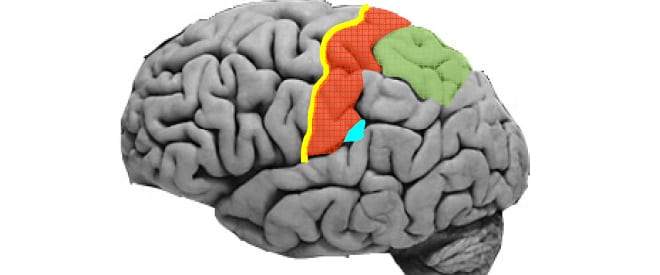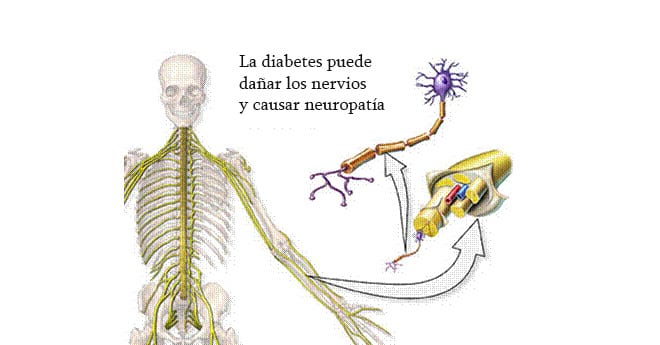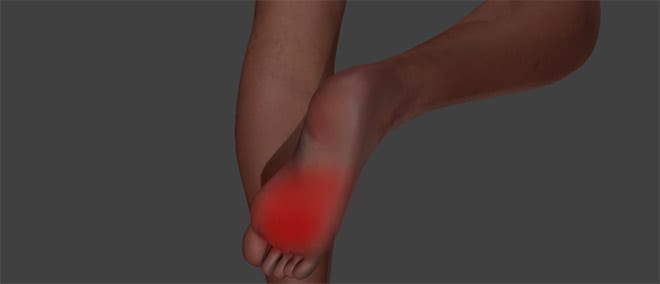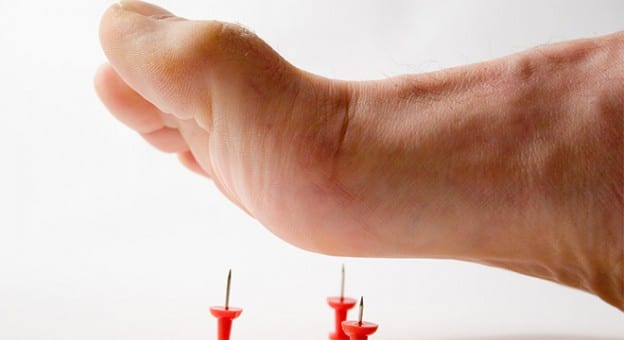How to relieve neuropathic pain
Neuropathic pain is a malfunction of the somatosensory system.which carries stimuli of various kinds (tactile, thermal, etc.) to the sites in the brain where the information is processed.

When the somatosensory system suffers an injury due to many causes, for example, the diabetes mellitus, the patient begins to feel pain from trivial stimuli or to perceive painful stimuli that in normal situations would not be painful.
Diabetic neuropathies are a family of nerve disorders caused by diabetes.. People with diabetes can, over time, develop nerve damage throughout the body. Some people with nerve damage have no symptoms. Others may have symptoms such as pain, tingling or numbness, loss of sensation in the hands, arms, feet and legs. Nerve problems can occur in all organ systems, including the digestive tract, heart and sex organs.
About 60 to 70 percent of people with diabetes have some form of neuropathy.. People with diabetes can develop nerve problems at any time, but the risk increases with age and longer duration of diabetes. The highest rates of neuropathy are found among people who have had diabetes for at least 25 years. Diabetic neuropathies also appear to be more common in people who have problems controlling their blood glucose, also called blood sugar, as well as those with high levels of blood fat and blood pressure and those who are overweight.
Causes of diabetic neuropathies
The causes are probably different for different types of diabetic neuropathy. Researchers are studying how prolonged exposure to high blood glucose levels causes nerve damage. Nerve damage is probably due to a combination of factors:

- Metabolic factors, such as high blood glucose, long duration of diabetes, abnormal blood fat levels, and possibly low insulin levels
- Neurovascular factors, leading to damage to the blood vessels that carry oxygen and nutrients to the nerves
- Autoimmune factors causing inflammation in nerves
- mechanical nerve injury, such as carpal tunnel syndrome
- Hereditary traits increasing susceptibility to nerve disease
- Lifestyle factors, such as smoking or alcohol consumption
What are the symptoms of diabetic neuropathies?
Symptoms depend on the type of neuropathy, and the nerves that are affected. Some people with nerve damage have no symptoms at all. For others, the first symptom is often numbness, tingling or pain in the feet..

Symptoms are usually minor at first, and as most nerve damage occurs over several years, mild cases may go unnoticed for a long time. Symptoms can affect the sensory, motor and autonomic nervous system.. In some people, especially those with focal neuropathy, the onset of pain can be sudden and severe.
Symptoms of nerve damage can include
- Numbness, tingling or pain in the feet, legs, hands, arms, fingers and toes.
- Atrophy of the muscles of the feet or hands
- Indigestion, nausea or vomiting
- Diarrhoea or constipation
- Dizziness or fainting due to a fall in blood pressure after standing or sitting
- Problems with urination
- Erectile dysfunction in men or vaginal dryness in women
- Weakness
Symptoms that are not due to neuropathy, but often accompany it, include weight loss and depression.
Types of diabetic neuropathy
Diabetic neuropathy can be classified as peripheral, autonomic, proximal, or focal. Each of these affects different parts of the body in different ways.
- The peripheral neuropathythe most common type of diabetic neuropathy, causes pain or loss of sensation in the feet, legs, hands, arms, fingers and toes.
- The autonomic neuropathy causes changes in digestion, bowel and bladder function, sexual response, and perspiration. It can also affect the nerves that serve the heart and control blood pressure, as well as the nerves to the lungs and eyes. Autonomic neuropathy can also cause asymptomatic hypoglycaemia, a condition in which people no longer experience the warning symptoms of low blood glucose.
- The proximal neuropathy causes pain in the thighs, hips or buttocks and leads to weakness in the legs.
- The focal neuropathy manifests with sudden weakness of a nerve or group of nerves, causing muscle weakness or pain. Any nerve in the body can be affected.
Peripheral neuropathy
Peripheral neuropathyalso called distal symmetrical neuropathy or sensorimotor neuropathy, consists of damage to the nerves in the arms and legs.. The feet and legs are likely to be affected before the hands and arms. Many people with diabetes have signs of neuropathy that a doctor may be aware of, but do not feel symptoms. Symptoms of peripheral neuropathy may include:
- numbness or insensitivity to pain or temperature
- a tingling, burning or stinging sensation
- sharp pains or cramps
- extreme sensitivity to touch, even a light touch
- loss of balance and coordination
These symptoms are often worse at night.

Peripheral neuropathy can also cause muscle weakness and loss of reflexes, especially in the ankle, leading to changes in the way a person walks. Foot deformities such as hammertoes and midfoot collapse may occur. Blisters and sores may appear in numb areas. of the foot because the pressure or injury goes unnoticed. If there is an infection and it is not treated in time, the infection can spread to the bone, and then the foot may have to be amputated. Many amputations can be prevented if minor problems are caught and treated early.
The best way to prevent neuropathy is to keep blood glucose levels as close to the normal range as possible.. Maintaining safe blood glucose levels protects nerves throughout the body.
Diabetic neuropathy pain relief
Doctors usually treat painful diabetic neuropathy with oral medications, although other types of treatment may help some people. People with severe nerve pain may benefit from a combination of medications or treatments and should consider talking to a doctor about treatment options.
The medicines used to help relieve diabetic nerve pain include:
- tricyclic antidepressants
- other types of antidepressants,
- anticonvulsants
- opioids
All medicines have side effects, and some are not recommended for use in older adults or people with heart disease. Because pain medicines such as paracetamol and ibuprofen may not work well for the treatment of most nerve pain and can have serious side effects, some experts recommend avoiding these medicines.

Treatments applied to the skin - usually on the feet - include capsaicin cream and lidocaine patches. (Lidoderm, Lidopain). Studies suggest that nitrate sprays or foot patches may relieve pain. Studies of alpha-lipoic acid, an antioxidant, and evening primrose oil suggest they may help relieve symptoms and improve nerve function in some patients.
A device called a cot bed can keep sheets and blankets from touching sensitive feet and legs. Acupuncture, biofeedback, or physical therapy can help relieve pain in some people.. Treatments involving electrical nerve stimulation, magnetic therapy, and laser or light therapy may be helpful but need further study. Researchers are also studying several new therapies in clinical trials.



0 thoughts on “¿Influye la diabetes en el dolor neuropático periferico?”
I have proximal neuropathy and I don't know if vitamins B1, B6 and B12 can help me.
Thank you Florinda for your query. We will report it to the clinic and they will respond as soon as possible. Best regards